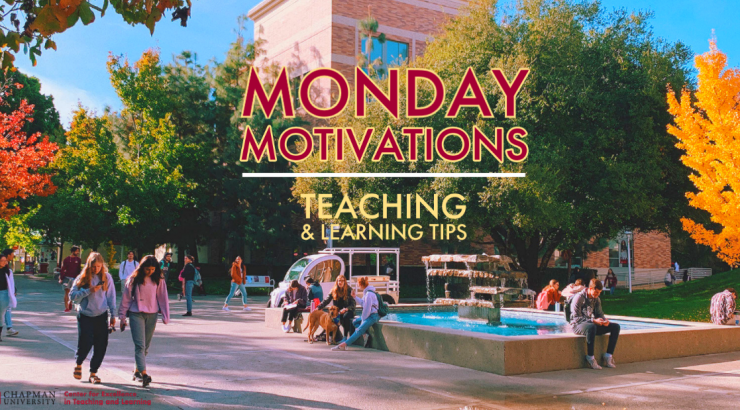
Teaching Tips for the Week of August 28, 2023 Welcome to the Fall Term!
August 24, 2023
Calming Anxiety and Inspire Students: First Day Strategies
Do you remember how you felt on your first day of college? For most of us, this was a time of great excitement and anticipation – perhaps a chance to live away from home, make new friends, and explore interesting ideas and diverse perspectives that would help shape our adult lives. But this excitement is often accompanied by several stressors that challenge psychosocial development. According to a recent study, researchers found that:
“adjustment generally worsens across the first 2 years in the domains of psychological functioning (decreased self-esteem, increased depression, anxiety, and stress), cognitive-affective strategies (decreased active emotional coping, increased avoidant emotional coping), and social adjustment (decreased social support from friends) …From a developmental psychopathology perspective, the period of emerging adulthood, and its overlap with college, represents a critical time wherein mental health trajectories may experience turbulence and change” (p.1).
There is also mounting evidence that college students today (post-Covid) are more stressed and anxious than ever before. So, what can faculty do to ease this transition and reduce levels of stress and anxiety? Here we provide a few tips on how to create a safe, welcoming and supportive environment for learning – starting on the first day.
- Be authentic, personable, and inspire students – Introduce yourself and why you are so passionate about your discipline. What helped you decide your major as an undergraduate? Who and what inspired/inspires you? What value is this course content to your students today and beyond Chapman? Perhaps you may even want to create a short introductory video to embed in your Canvas course shell.
- Create a ‘sanctuary for learning’ (Mays Imad) – Create time/space for students to introduce themselves (in-class, small groups, or even in an introductory discussion board in Canvas). This is time well spent because student success is related to sense of belonging. Work with students to establish some agreements for the classroom; rights and responsibilities (e.g., respect, listening, remaining open to new ideas and perspectives, etc.).
- Whet students’ appetite for the course content – Present a current or recent (authentic) problem related to the discipline or that draws upon the discipline for a solution. Case studies are excellent ways to both engage students with the content and help them get to know one another.
- Clarify learning objectives and course expectations – In words students will understand, share what they will better know, understand, and be able to do at the conclusion of your course. Highlight areas of the syllabus that clarify your responsibilities as the professor and their responsibilities as students (e.g., preparedness, academic integrity, open communication, respect for diverse cultures, ways of knowing and being, and perspectives).
- Collect baseline data on students’ prior knowledge, interests, and needs – The best way you can prepare to support student success is to know where they are coming into the course (regarding foundational understandings/skills), what interests they have (to increase motivation and engagement), and if they have any special needs or concerns of which you should be aware (e.g., disability, life challenge, such as an ill parent, etc.). Consider collecting information via the Canvas quiz tool (ungraded) or a paper survey; to collect anonymous data, you can use a tool such as Poll Everywhere or Qualtrics (all instructors have access to these tools).
Set Your Students Up for Success on Their Path to Greatness!
Interested in exploring any of these ideas further or discussing how you might implement them in your own teaching practices? Is there a tip you’ve tried that you would like to share with colleagues? Contact CETL or schedule a consultation to continue the conversation.


